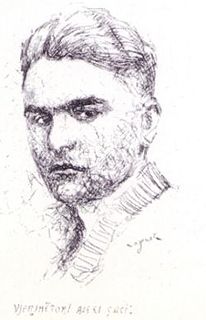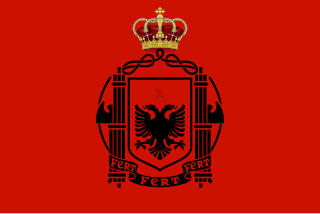
The Prague Spring was a period of political liberalization and mass protest in the Czechoslovak Socialist Republic. It began on 5 January 1968, when reformist Alexander Dubček was elected First Secretary of the Communist Party of Czechoslovakia (KSČ), and continued until 21 August 1968, when the Soviet Union and other Warsaw Pact members invaded the country to suppress the reforms.

Ismail Kadare is an Albanian novelist, poet, essayist, screenwriter, and playwright. He is a leading international literary figure and intellectual. He focused on poetry until the publication of his first novel, The General of the Dead Army, which made him famous internationally.

Musine Kokalari was an Albanian prose writer and politician in Albania's pre-communist period. She was the founder of the Social-Democratic Party of Albania in 1943. Kokalari was the first published female writer of Albania. After a short involvement in politics during World War II, she was persecuted by the communist regime in Albania, and not allowed to write anymore. She died in poverty and complete isolation.

The Party of Labour of Albania, sometimes referred to as the Albanian Workers' Party (AWP), was the ruling and sole legal party of Albania during the communist period (1945–1991). It was founded on 8 November 1941 as the Communist Party of Albania but changed its name in 1948. The party was dissolved on 13 June 1991 and succeeded by the Socialist Party of Albania. For most of its existence, the party was dominated by its First Secretary, Enver Hoxha, who was also the de facto leader of Albania.
Albanian literature stretches back to the Middle Ages and comprises those literary texts and works written in Albanian. It may also refer to literature written by Albanians in Albania, Kosovo and the Albanian diaspora particularly in Italy. Albanian occupies an independent branch within the Indo-European family and does not have any other closely related language. The origin of Albanian is not entirely known, but it may be a successor of the ancient Illyrian language.

Dritëro Agolli was an Albanian poet, writer and politician. He studied in Leningrad in the Soviet Union, and wrote primarily poetry, but also short stories, essays, plays, and novels. He was head of the League of Writers and Artists of Albania from 1973 until 1992. He was a leading figure in the Albanian Communist nomenklatura.

Aleks Çaçi was an Albanian author of the socialist realism time.
Arcade Publishing is an independent trade publishing company that started in 1988 in New York, USA. It publishes American and world fiction and nonfiction.
After the October Revolution of November 7, 1917 there was a movement within the Soviet Union to unite all of the people of the world under Communist rule. This included the Eastern bloc countries as well as the Balkan States. Communism as interpreted by Vladimir Lenin and his successors in the Soviet government required the abolition of religion and to this effect the Soviet government launched a long-running campaign to eliminate religion from society. Since some of these Slavic states tied their ethnic heritage to their ethnic churches, both the peoples and their churches were targeted by the Soviets.

The fall of Communism in Albania, the last such event in Europe outside the Soviet Union, started in December 1990 with student demonstrations in the capital, Tirana, although protests started in January that year in other cities like Shkodra and Kavaja. The Central Committee of the communist Party of Labour of Albania allowed political pluralism on 11 December and the largest opposition party, the Democratic Party, was founded the next day. March 1991 elections left the Party of Labour in power, but a general strike and urban opposition led to the formation of a "stability government" that included non-communists. Albania's former communists were routed in elections in March 1992 amid economic collapse and social unrest, with the Democratic Party winning most seats and its party head, Sali Berisha, becoming president.

The Italian colonists in Albania were Italians who, between the two world wars, moved to Albania to colonize the Balkan country for the Kingdom of Italy.
Laiko Vima is a bi-weekly newspaper published in Gjirokastër, that serves the local Greek communities in Albania. It was founded in 1945 and was the only newspaper printed in the Greek language during the Socialist People's Republic of Albania.
The Military ranks of Albania are the military insignia used by the Albanian Armed Forces.
Kasëm Trebeshina was an Albanian member of national resistance during World War II part of the National Liberation Movement, an actor, translator, communist prosecutor and writer. He was one of the founders of the notorious communist secret police Sigurimi.

The Rise and Fall of Comrade Zylo is an Albanian satiric novel written by Dritëro Agolli in 1972. It is Dritëro Agolli's most famous and critically acclaimed novel. The book was written during the communist regime in Albania, a time during which freedom of speech was very limited to non-existent. The composition of the whole book is similar to that of a report, record or official biography. Originally published in the satirical magazine Hosteni, it first appeared in book form in 1973.
Xhevahir Spahiu is an Albanian poet.
The Swedish–Albanian Association was a Swedish friendship association, founded during the Cold War to support the People's Socialist Republic of Albania and the Party of Labour of Albania, and to build Swedish-Albanian cultural relations. The group, among other activities, translated and published the works of Albanian leader Enver Hoxha - among them Imperialismen och revolutionen (1979) on the subject of the Sino-Albanian split - as well as books on Albanian culture, tourist guide books, and a novella by the author Dhimitër Shuteriqi. The Swedish-Albanian Association's Bulletin and Albania and Us were two regular publications.
Natasha Lako is an Albanian poet and novelist. She belongs to the country's first generation of women writers.

Jolanda Kodra (1910–1963) was an Italian-Albanian writer and translator, one of the first woman writers in the Albanian language, as well as a translator into the Italian language of the works of Albanian writers, such as Ndre Mjeda, Migjeni, Petro Marko, and Sterjo Spasse.
Anarchism in Albania was first introduced by the Italian anarchist volunteers who fought during the Albanian revolts against the Ottoman Empire and later opposed the Italian military occupation of the country. Native Albanian anarchists first organised themselves within the rising communist movement during the 1920s, but libertarian tendencies were eventually supplanted by Marxism-Leninism, which became the leading tendency by the 1930s. After World War II, a People's Republic was established by the communists under Enver Hoxha, which briefly implemented socialist self-management before drifting first towards Stalinism then Maoism. When communist rule collapsed, the country went through rapid liberalization which caused an insurrection against the state, leading to renewed anarchist analysis of the situation in Albania and the rise of anarchist sympathies among Albanian migrants abroad.









